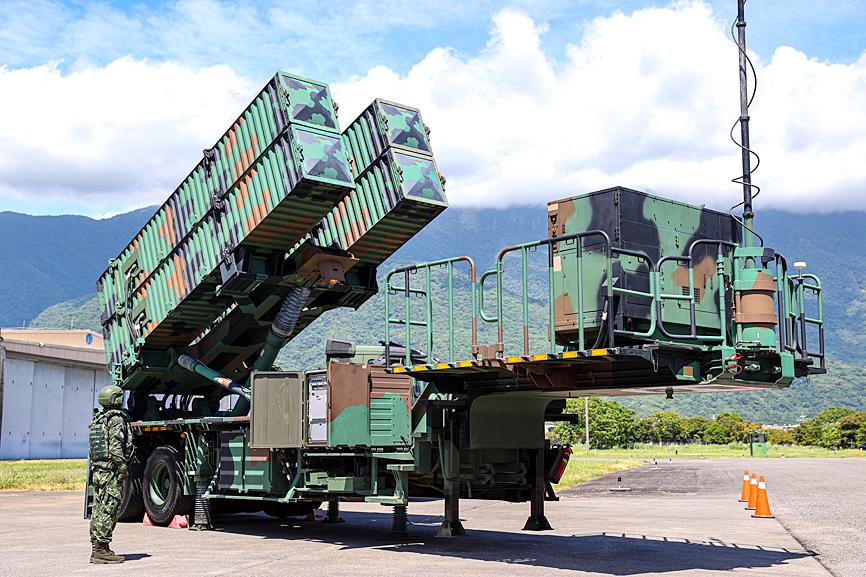The Hsiung Feng III missile project’s former chief engineer, Chang Cheng (張誠), has said that the military needs to extend the altitude of the Tien Kung III air-defense missile to effectively counter any threats from China.
In response to the rising military threat from China, the Ministry of National Defense has taken steps to increase missile production, raising production of the Tien Kung III missile from 48 units to 96 units per year, a defense official speaking on condition of anonymity said yesterday.
China’s live-fire missile drills earlier this month showed that the Tien Kung III air-defense missile cannot reach the altitude necessary to intercept some Chinese strikes, Chang wrote on Facebook on Tuesday.

Photo: CNA
The Chinese People’s Liberation Army (PLA) fired four Dongfeng-17 ballistic missiles into strategically key waters off eastern Taiwan where Taiwanese warships shelter and US forces would travel to counter a Chinese invasion, Chang said.
The missiles likely flew over Taiwan proper at an altitude of about 100km, the height they should reach when traveling the last one-third of their effective range, while the extended-range Tien Kung III has a service ceiling of 70km, he said.
This means the country’s premier air defense missile is incapable of shooting down Chinese ballistic missiles, he said.
“To intercept the PLA’s guided missiles at altitudes of 100km or more, the Chungshan Institute [of Science and Technology] would have to create a system capable of reaching 150km, similar to the US’ Terminal High Altitude Area Defense system,” Chang said.
The navy and the institute should join forces to design surface warships with an advanced air defense capability, mirroring that of the US Navy’s Advanced Electronic Guidance and Instrumentation System (AEGIS), he said.
AEGIS-equipped ships can defend a fleet from ballistic missiles by utilizing Standard Missile-2s and Standard Missile-6s, which are capable of defeating ballistic missiles, Chang said, adding that Hai Kung III missiles, which are close to being completed by the institute, could be used on such a warship.
A vertical launch system should also be built so that the theoretical warships could fire Hsiung Sheng missiles that have been designed for naval use, he said.
The anonymous defense official yesterday said that the extended-range Tien Kung III’s maximum interception height is probably 45km.
The missile launches seen on Thursday near the institute’s Jioupeng Military Base in Pingtung County’s Manjhou Township (滿州) were likely a test in which two extended-range missiles were fired at a simulated ballistic missile, the official said.
The military plans to establish 17 launch sites for the Tien Kung III missile before 2026 as part of Taiwan’s “porcupine” defense strategy, they said, adding that similar measures are being taken for anti-ship missiles.
The porcupine strategy refers to an asymmetric strategy that aims to make a territory difficult and costly to invade, which in part involves using anti-aircraft, anti-ship and anti-tank missiles against an opposing force’s large and expensive weapons platforms.

CHAOS: Iranians took to the streets playing celebratory music after reports of Khamenei’s death on Saturday, while mourners also gathered in Tehran yesterday Iranian Supreme Leader Ayatollah Ali Khamenei was killed in a major attack on Iran launched by Israel and the US, throwing the future of the Islamic republic into doubt and raising the risk of regional instability. Iranian state television and the state-run IRNA news agency announced the 86-year-old’s death early yesterday. US President Donald Trump said it gave Iranians their “greatest chance” to “take back” their country. The announcements came after a joint US and Israeli aerial bombardment that targeted Iranian military and governmental sites. Trump said the “heavy and pinpoint bombing” would continue through the week or as long

TRUST: The KMT said it respected the US’ timing and considerations, and hoped it would continue to honor its commitments to helping Taiwan bolster its defenses and deterrence US President Donald Trump is delaying a multibillion-dollar arms sale to Taiwan to ensure his visit to Beijing is successful, a New York Times report said. The weapons sales package has stalled in the US Department of State, the report said, citing US officials it did not identify. The White House has told agencies not to push forward ahead of Trump’s meeting with Chinese President Xi Jinping (習近平), it said. The two last month held a phone call to discuss trade and geopolitical flashpoints ahead of the summit. Xi raised the Taiwan issue and urged the US to handle arms sales to

BIG SPENDERS: Foreign investors bought the most Taiwan equities since 2005, signaling confidence that an AI boom would continue to benefit chipmakers Taiwan Semiconductor Manufacturing Co’s (TSMC, 台積電) market capitalization swelled to US$2 trillion for the first time following a 4.25 percent rally in its American depositary receipts (ADR) overnight, putting the world’s biggest contract chipmaker sixth on the list of the world’s biggest companies by market capitalization, just behind Amazon.com Inc. The site CompaniesMarketcap.com ranked TSMC ahead of Saudi Aramco and Meta Platforms Inc. The Taiwanese company’s ADRs on Tuesday surged to US$385.75 on the New York Stock Exchange, as strong demand for artificial intelligence (AI) applications led to chip supply constraints and boost revenue growth to record-breaking levels. Each TSMC ADR represents

State-run CPC Corp, Taiwan (CPC, 台灣中油) yesterday said that it had confirmed on Saturday night with its liquefied natural gas (LNG) and crude oil suppliers that shipments are proceeding as scheduled and that domestic supplies remain unaffected. The CPC yesterday announced the gasoline and diesel prices will rise by NT$0.2 and NT$0.4 per liter, respectively, starting Monday, citing Middle East tensions and blizzards in the eastern United States. CPC also iterated it has been reducing the proportion of crude oil imports from the Middle East and diversifying its supply sources in the past few years in response to geopolitical risks, expanding